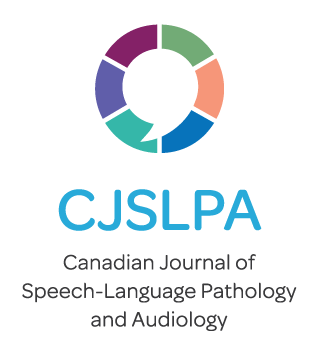

| Author(s) |
Monique Charest Paige Borger Carolyne Chan Kaitlin Sanders Beatrice Yip Lu-Anne McFarlane Phyllis Schneider |
| Volume | 43 |
| Number | 1 |
| Year | 2019 |
| Page(s) | 49-61 |
| Language | English |
| Category | Tutorial |
| Keywords |
Language development Language assessment Diagnosis Language delay Language impairment Language disorder Preschool Illusory recovery |
| Abstract |
The research literature reveals two seemingly contradictory findings about the trajectory of developmental language disorders identified in the preschool years. Some studies suggest that many children achieve normal language by about the age of kindergarten entry. Other studies, however, indicate that most language disorders persist over a much longer time frame. Scarborough and Dobrich (1990) suggested that the apparent inconsistency in findings might arise as the result of patterns of illusory recovery at around kindergarten age. Periods of plateau in typical language development may allow children with language disorders to appear to have caught up to their peers, only to experience renewed challenges in the school years. The purpose of the current paper was to examine the literature for evidence in support of or inconsistent with the illusory recovery hypothesis and to discuss the clinical implications that follow from the evidence.
On retrouve, dans la littérature, deux résultats apparemment différents quant à la trajectoire des enfants ayant un trouble développemental du langage identifié pendant la période préscolaire. En effet, les résultats de certaines études suggèrent que de nombreux enfants vont présenter des habiletés langagières dans les limites de la normale lorsque ceux-ci seront en âge de commencer la maternelle. Cependant, les résultats d’autres études suggèrent que la plupart des enfants vont présenter un trouble du langage qui va persister sur une période beaucoup plus longue. Scarborough et Dobrich (1990) ont suggéré que ces résultats apparemment différents pourraient découler d’un patron de récupération illusoire (illusory recovery) qui se produirait lorsque les enfants sont en âge de commencer la maternelle. Les périodes où les enfants au développement typique atteignent un plateau dans le développement de leurs habiletés langagières pourraient permettre aux enfants ayant un trouble du langage de donner l’impression de rattraper leurs pairs sur le plan du langage, pour néanmoins connaître de nouveaux défis après l’entrée à l’école. Le présent article avait pour objectif d’investiguer la littérature afin d’identifier les sources de support, ou encore, les sources inconsistantes avec l’hypothèse de récupération illusoire, en plus de discuter des implications cliniques qui en découlent. |
| Record ID | 1238 |
| Link | https://cjslpa.ca/files/2019_CJSLPA_Vol_43/No_1/CJSLPA_Vol_43_No_1_2019_MS_1147.pdf |
CJSLPA is an open access journal which means that all articles are available on the Internet to all users immediately upon publication. Users are allowed to read, download, copy, distribute, print, search, or link to the full texts of the articles, or use them for any other lawful purpose.
CJSLPA does not charge authors publication or processing fees.
Copyright of the Canadian Journal of Speech-Language Pathology and Audiology is held by Speech-Language and Audiology Canada (SAC). Appropriate credit must be given (SAC, publication name, article title, volume number, issue number and page number[s]) but not in any way that suggests SAC endorses you or your use of the work. You may not use this work for commercial purposes. You may not alter, transform, or build upon this work.